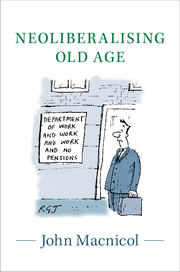1 - The changing meanings of old age
Published online by Cambridge University Press: 05 November 2015
Summary
This book explores an issue central to the study of age and ageing: Do we wish to preserve old age as a discrete stage of life, to be protected by welfare policies specifically targeting ‘the old’? Should old age be accorded a privileged status? This may recognise the needs of a particular age group with regard to health, income and social care. But by doing so, we support the inaccurate and possibly offensive definition of ‘old age’ as the stage of life beyond age 65 – a demarcation line that has no biological or cognitive significance, since human beings age at very different rates. Defining old age in this way may ghettoise and marginalise one group of people in society, encouraging prejudice against them via policies that ‘single out, stigmatise and isolate the aged from the rest of society’, in a way that can be seen as subtly ageist. On the other hand, should we dispense with age as a categorisation and work towards an ‘age-irrelevant’, ‘age-neutral’ or ‘ageless’ society – one in which individuals will be judged by the content of their character, rather than their chronological age? Is the concept of old age an outmoded relic from the past?
In the pages that follow, the answer will broadly be that the latter course is fraught with dangers for older people and has emerged in the context of wider attacks on the welfare rights of all marginalised people in society that are themselves a product of the new economic and political agendas that began to take root in the 1970s and are now in full bloom in the United Kingdom (UK) and United States of America (USA). The term ‘neoliberalisation of old age’ will be used to describe this process. Neoliberalism as an ideology will be subject to a forensic and critical analysis, particularly regarding its effect on welfare states. In addition, the current old age agenda will be placed in its historical context. In particular, an approximate threefold periodisation of postwar policy developments will be strongly implicit. The first period, lasting from 1945 to the OPEC-led oil price hike of 1973, was a period in which old age was generally viewed in western societies as a stage of life to be protected and the right to retirement remained sacrosanct.
- Type
- Chapter
- Information
- Neoliberalising Old Age , pp. 1 - 21Publisher: Cambridge University PressPrint publication year: 2015

